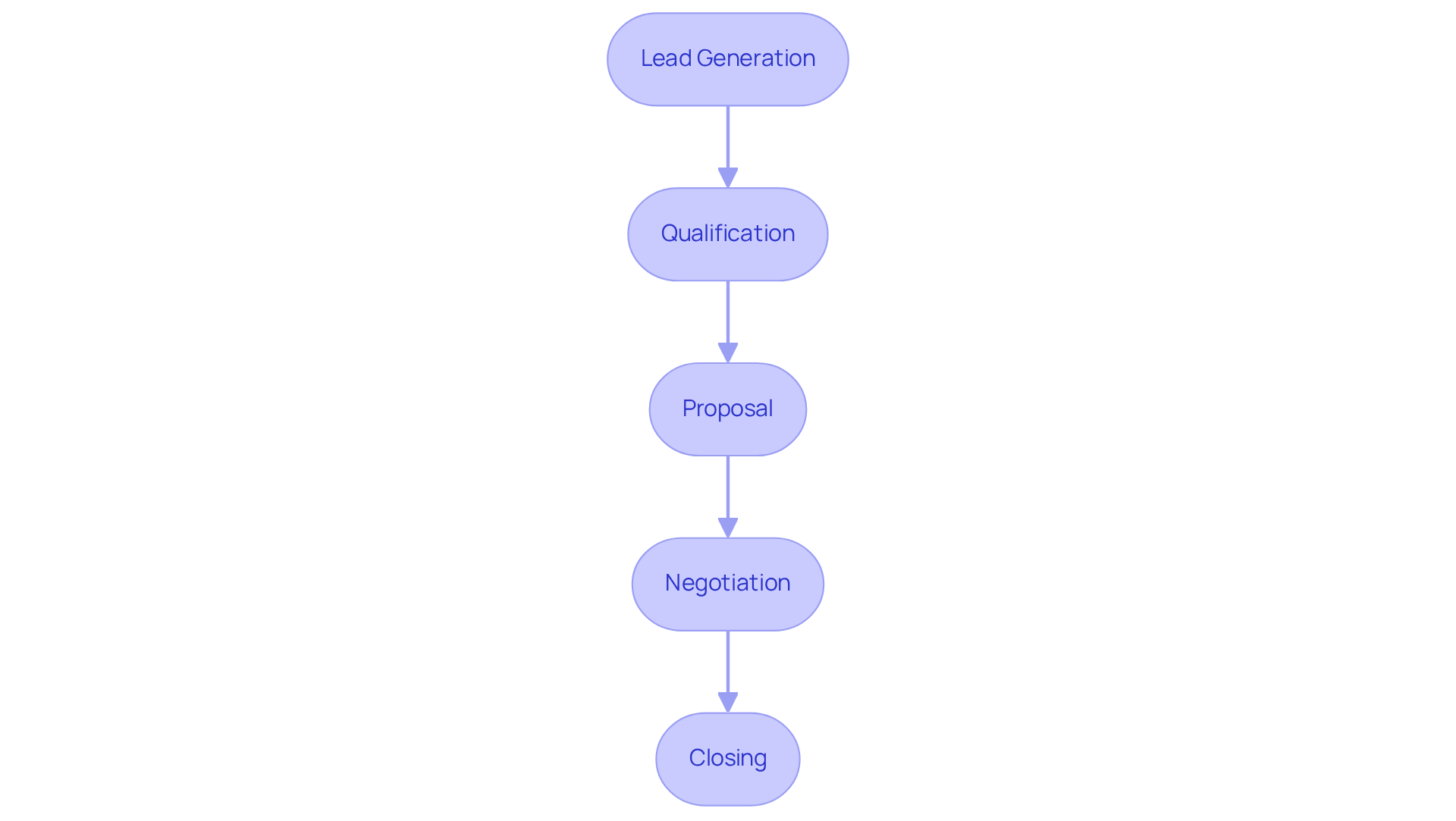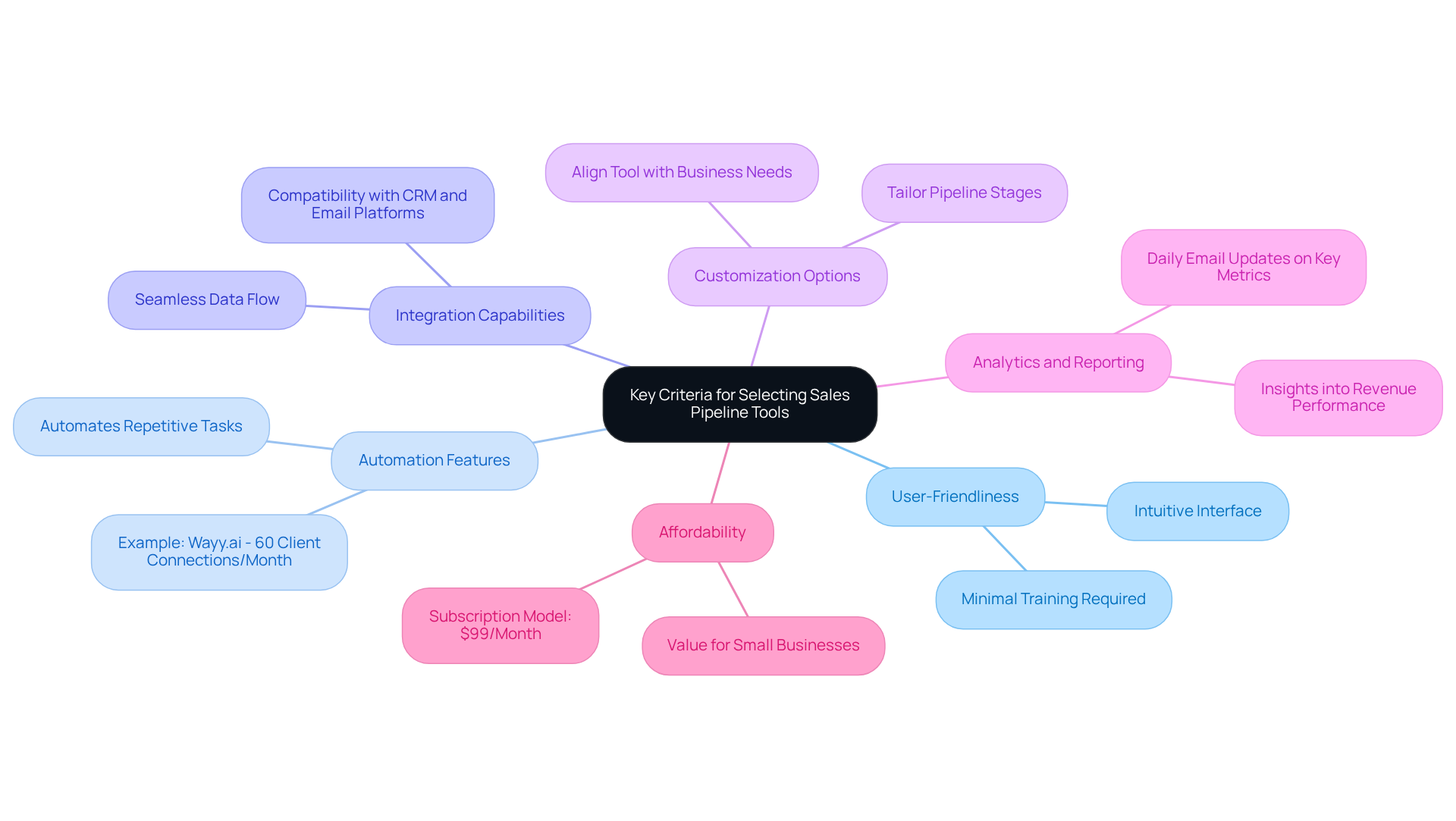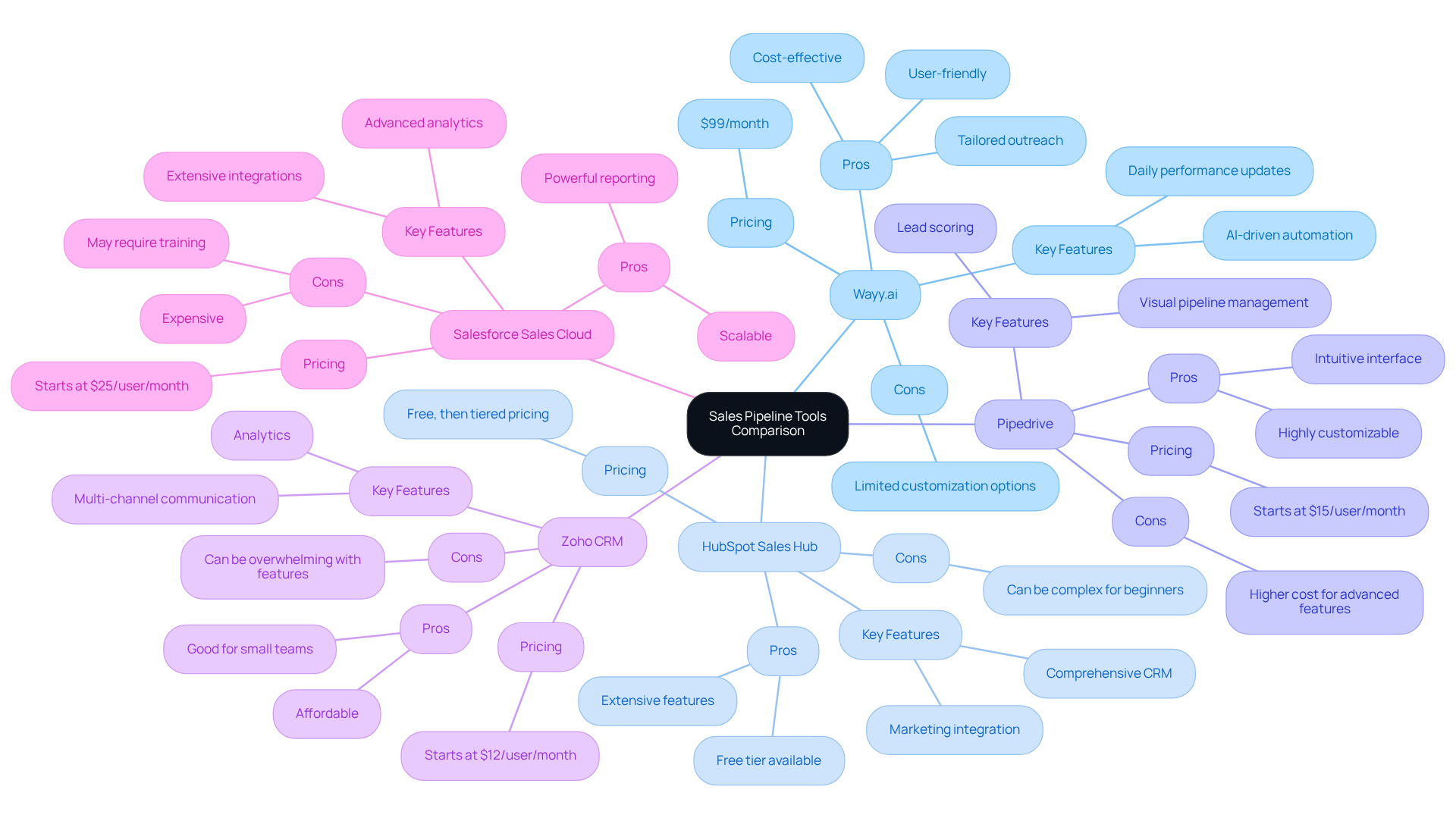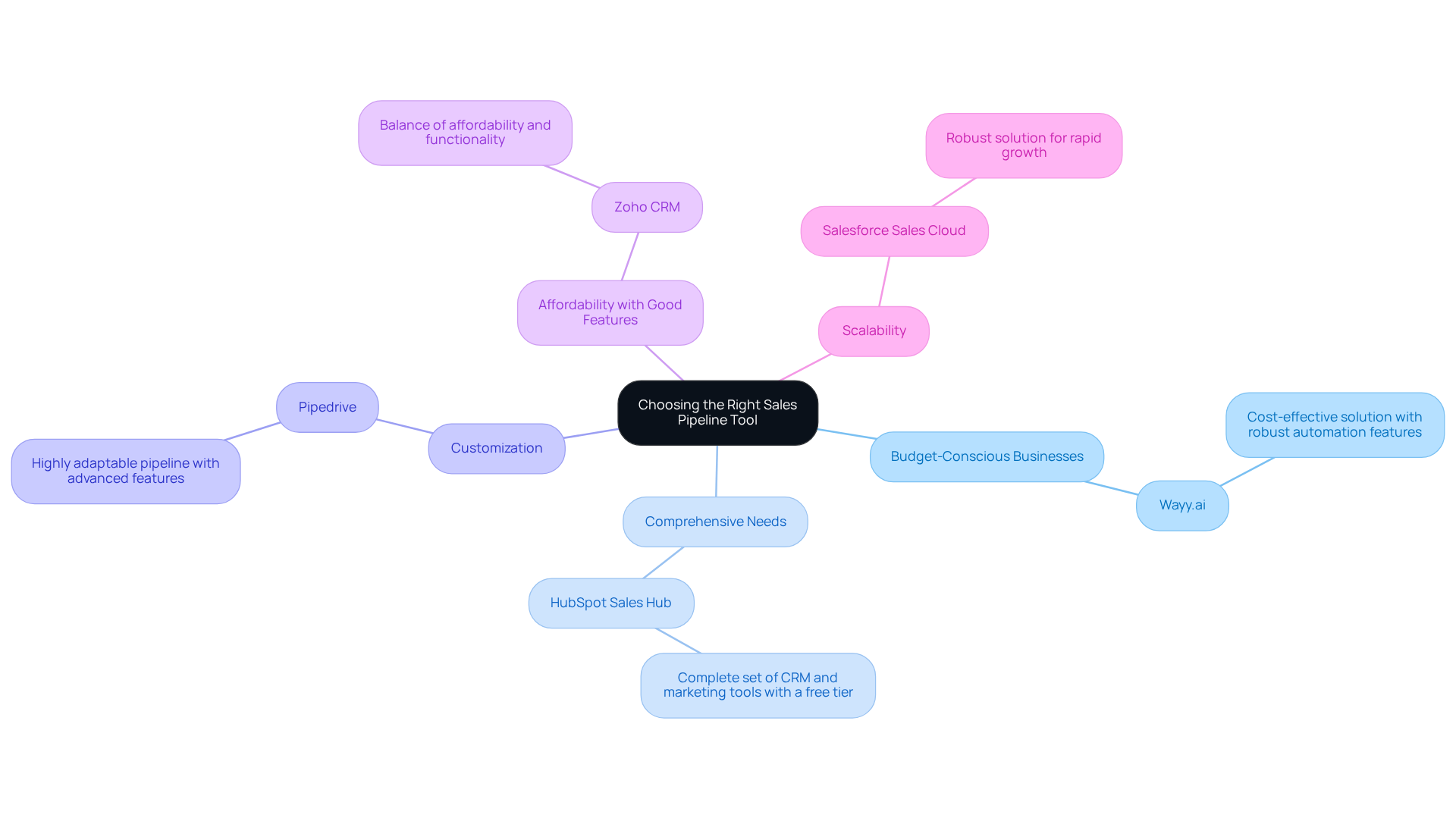Overview
This article thoughtfully compares five essential sales pipeline tools for small businesses, shining a light on their unique features, pros, cons, and pricing models. By providing this comparative analysis, we aim to empower small business owners to make informed decisions that align with their specific needs and budget constraints. Ultimately, this guidance facilitates effective sales process optimization, helping you navigate the challenges you face with confidence. Together, we can achieve success in streamlining your sales efforts.
Introduction
Understanding the intricacies of a sales pipeline can truly be a game-changer for small businesses striving for growth. These pipelines not only visualize the customer journey but also empower owners to streamline their processes and enhance conversion rates.
However, with so many sales pipeline tools available, how can you discern which option truly meets your unique needs? This article delves into five essential sales pipeline tools, offering a comparative analysis that highlights their features, benefits, and potential drawbacks.
Together, we will guide you toward making informed decisions for your sales strategies, ensuring that you feel supported every step of the way.
Understanding Sales Pipelines: A Foundation for Small Businesses
A revenue pipeline serves as a visual representation of the journey prospective clients take, from the moment they first engage with your business to the point of finalizing an agreement. For small business owners, grasping this concept is crucial. It not only helps track revenue processes but also allows you to identify obstacles and prioritize your most promising prospects effectively.
Let’s break down the typical stages of a sales pipeline:
- Lead Generation: This is where you identify potential customers through various channels, such as social media, networking events, and referrals. Think of it as casting a wide net to find those who might benefit from your offerings.
- Qualification: Here, you assess leads to see if they fit your target customer profile. This ensures that your efforts are focused on the prospects that hold the most promise.
- Proposal: At this stage, you offer customized solutions to qualified leads, showcasing how your business can address their specific needs and challenges.
- Negotiation: This phase involves discussing terms and tackling any objections that may arise, fostering a collaborative dialogue that nurtures the relationship.
- Closing: Finally, you secure the transaction and onboard the customer, solidifying the bond you've built.
By visualizing these stages with a sales pipeline tool, you can enhance your outreach strategies and boost your conversion rates. For instance, Wayy.ai empowers users to connect with over 60 target clients each month, significantly improving their sales pipeline without the burden of manual effort. This automation simplifies the process, allowing you to focus on nurturing relationships rather than getting bogged down by administrative tasks.
Sales pipeline tools are vital for fostering the growth of small enterprises. They provide a structured approach to managing leads using a sales pipeline tool, which can lead to increased efficiency and higher conversion rates. As industry experts highlight, a clearly defined pipeline helps businesses maintain momentum and adapt to changing market conditions, ultimately encouraging sustainable growth.
Together, let’s embrace the power of a to navigate the challenges you face and achieve the success you deserve.

Key Criteria for Selecting Sales Pipeline Tools for Small Businesses
When selecting a sales pipeline tool, we understand that small business owners face unique challenges. Here are some key criteria to consider that can truly make a difference:
- User-Friendliness: Look for an application with an intuitive interface that allows you to navigate effortlessly, without the need for extensive training. As Jim Hackett wisely noted, 'Small enterprises are the engines of local economies and the foundations of lively communities.' Therefore, having accessible resources is essential for your success.
- Automation Features: It's beneficial to seek options that automate repetitive tasks, such as follow-ups and lead scoring. This not only saves you time but also reduces manual effort. For instance, Wayy.ai enables users to create over 60 target client connections each month, showcasing how automation can enhance your revenue efforts.
- Integration Capabilities: Ensure the tool can integrate smoothly with your existing systems, such as CRM and email platforms, to facilitate seamless data flow. This integration can significantly ease your daily operations.
- Customization Options: The ability to tailor pipeline stages and fields to fit your unique business process is vital. Customization allows you to align the tool with your specific needs, making it more effective for your operations.
- Analytics and Reporting: Robust reporting features that offer insights into revenue performance, conversion rates, and pipeline health are critical for informed decision-making. With Wayy.ai, users receive daily email updates with key metrics, illustrating the importance of analytics in tracking your progress.
- Affordability: Finally, evaluate the pricing structure to ensure it aligns with the financial constraints that many small businesses face. It's important to find a solution that fits within your budget while still providing value.
By thoughtfully assessing these criteria, you can choose a sales pipeline tool that enhances your revenue initiatives and supports your growth. The case study of Wayy.ai exemplifies how its unique blend of automation and intelligence can streamline the client acquisition process, making it a valuable resource for small businesses like yours. Together, we can and foster the expansion of your enterprise.

Comparative Analysis of the Top 5 Sales Pipeline Tools for Small Businesses
As a small business owner, it can feel overwhelming to find the right sales pipeline tool. We understand your challenges, and that's why we’ve put together a comparative analysis of five popular options that cater specifically to your needs.
Tool Name | Key Features | Pros | Cons | Pricing Model
--------------------|---------------------------------------------------|------------------------------------------------|------------------------------------------------|-----------------------
Wayy.ai | AI-driven automation, daily performance updates | Cost-effective, user-friendly, tailored outreach | Limited customization options | $99/month
HubSpot Sales Hub | Comprehensive CRM, marketing integration | Free tier available, extensive features | Can be complex for beginners | Free, then tiered pricing
Pipedrive | Visual pipeline management, lead scoring | Highly customizable, intuitive interface | Higher cost for advanced features | Starts at $15/user/month
Zoho CRM | Multi-channel communication, analytics | Affordable, good for small teams | Can be overwhelming with features | Starts at $12/user/month
Salesforce Sales Cloud | Advanced analytics, extensive integrations | Powerful reporting, scalable | Expensive, may require training | Starts at $25/user/month
This comparison highlights the unique strengths of each tool, allowing you to weigh your options based on features, pricing, and usability. Remember, choosing the right tool is a step towards empowering your business for greater success. Together, we can navigate this journey and find the best solution for your needs.

Recommendations: Choosing the Right Sales Pipeline Tool for Your Business
When selecting the appropriate sales pipeline tool, we recognize that small business owners encounter unique challenges. Here are some thoughtful recommendations to guide your decision:
- For Budget-Conscious Businesses: Wayy.ai presents a with robust automation features, making it an ideal choice for small teams eager to enhance their outreach without straining their budget.
- For Comprehensive Needs: HubSpot Sales Hub is a great fit for organizations that require a complete set of CRM and marketing tools, especially those who can benefit from its free tier.
- For Customization: Pipedrive is recommended for enterprises needing a highly adaptable pipeline and willing to invest in advanced features that cater to their specific needs.
- For Affordability with Good Features: Zoho CRM stands out as an excellent option for compact teams seeking a balance of affordability and functionality.
- For Scalability: Salesforce Sales Cloud is perfect for companies anticipating rapid growth and needing a robust solution that can evolve with them, even if it comes at a higher price.
By thoughtfully aligning your choice of tool with your specific business needs and budget constraints, you can optimize your sales processes and drive growth effectively. Together, we can achieve success in navigating these decisions.

Conclusion
Understanding and effectively managing a sales pipeline is crucial for small businesses striving to succeed in competitive markets. By leveraging the right sales pipeline tools, you can streamline your processes, enhance lead management, and ultimately drive revenue growth. It’s important to select tools that align with your specific business needs, focusing on user-friendliness, automation features, integration capabilities, customization options, analytics, and affordability.
Key insights discussed include the stages of a sales pipeline—from lead generation to closing—and a comparative analysis of five top tools:
- Wayy.ai
- HubSpot Sales Hub
- Pipedrive
- Zoho CRM
- Salesforce Sales Cloud
Each tool brings unique strengths that cater to different business requirements, whether it’s cost-effectiveness, comprehensive features, customization, or scalability. By evaluating these options based on the outlined criteria, you can make informed decisions that enhance your sales strategies.
Ultimately, the right sales pipeline tool can empower you to manage your leads more efficiently and adapt to the ever-evolving market landscape. Embracing these technologies is a step toward sustainable growth and success. We encourage you to assess your unique needs and explore the recommended tools to find the perfect fit, ensuring a robust foundation for your sales efforts in the future.
Frequently Asked Questions
What is a sales pipeline?
A sales pipeline is a visual representation of the journey prospective clients take, from their initial engagement with a business to the finalization of an agreement.
Why is understanding a sales pipeline important for small business owners?
Understanding a sales pipeline is crucial for small business owners as it helps track revenue processes, identify obstacles, and prioritize promising prospects effectively.
What are the typical stages of a sales pipeline?
The typical stages of a sales pipeline include: - Lead Generation: Identifying potential customers through various channels. - Qualification: Assessing leads to see if they fit the target customer profile. - Proposal: Offering customized solutions to qualified leads. - Negotiation: Discussing terms and addressing objections. - Closing: Securing the transaction and onboarding the customer.
How can sales pipeline tools enhance outreach strategies?
Sales pipeline tools help visualize the stages of the pipeline, which can enhance outreach strategies and boost conversion rates by streamlining the process and focusing on nurturing relationships.
What is the benefit of using automation in sales pipelines?
Automation, such as tools like Wayy.ai, simplifies the sales process by allowing users to connect with multiple target clients each month, enabling them to focus on relationship-building rather than administrative tasks.
How do sales pipeline tools contribute to the growth of small businesses?
Sales pipeline tools provide a structured approach to managing leads, which can lead to increased efficiency, higher conversion rates, and help businesses maintain momentum and adapt to changing market conditions.




